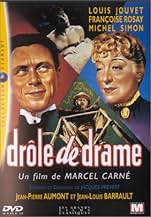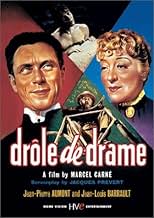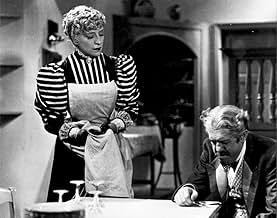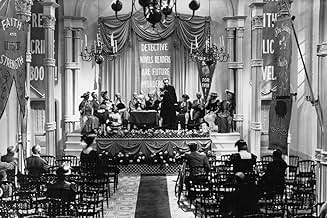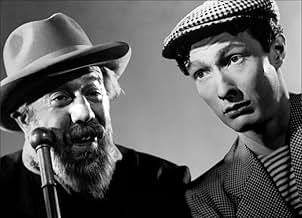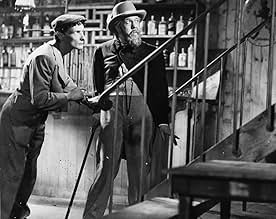Drôle de drame
- 1937
- Tous publics
- 1h 34m
In Victorian London, a crime novelist and his wife fake their disappearance in order to hide from an uptight Anglican bishop who is leading a campaign against the "evils" of crime fiction.In Victorian London, a crime novelist and his wife fake their disappearance in order to hide from an uptight Anglican bishop who is leading a campaign against the "evils" of crime fiction.In Victorian London, a crime novelist and his wife fake their disappearance in order to hide from an uptight Anglican bishop who is leading a campaign against the "evils" of crime fiction.
- Director
- Writers
- Stars
- Mrs. McPhearson
- (as Jeanne Lory)
- Le balayeur
- (as Génin)
- L'inspecteur-chef Bray
- (as Alcover)
- Director
- Writers
- All cast & crew
- Production, box office & more at IMDbPro
Featured reviews
The film is the adaptation of a novel by the British writer J. Storer Clouston, the adaptation being signed by Carné and the eminent poet Jacques Prévert, screenwriter or co-screenwriter of numerous famous French films. The story takes place in London, but it is more of a French version of London, or rather as it would have been represented on a French comedy stage in the first half of the 20th century. We are dealing with serial murders and not very competent detectives from Scotland Yard who solve cases in their sleep, with a Puritan minister and a mysterious crime novelist, with enigmatic disappearances and double identities, with journalists thirsty for sensational news and a milkman in love. The most improbable events follow each other at a rapid pace. Police intrigue and theatrical vaudeville meet in an original mix.
The cast is stellar. Michel Simon appears in a double role alongside Louis Jouvet. The two actors, who were among the superstars of interwar French cinema, did not really get on with each other, but perhaps it was the tension between them that contributed to the quality of some scenes that have become anthological. We can also watch Jean-Louis Barrault, who would become one of the great actors and directors of the French theatre and who was then only 27 years old and dedicated most of his artistic efforts to film, with 5 films in his filmography in each of the years 1936, 1937, 1938. Here he has a secondary, but important and not at all simple, role - a serial killer who also falls in love. Every scene in which he appears is a delight. Satirical arrows at British morals and social formalisms abound. 'Drôle de drame' was and is superb comic entertainment.
A fantastic example of my appreciation of this older style is this movie, Drôle de Drame. Like such great 30s French films as The Baker's Wife, the film abounds with WONDERFUL and very colorful supporting characters. Are they altogether realistic, NOT IN THE LEAST--but they are wonderful, nevertheless. They remind me a lot of the odd characters you might find in films by Frank Capra or Preston Sturgis. The silliness of the film also reminds me of films like Arsenic and Old Lace or Bringing Up Baby--and this a a STRONG complement indeed! In addition, this film is a delight on the eyes--with BETTER than Hollywood camera and set design--it just looks marvelous! So, despite all these positives why does it only get a 9?! Well, the plot is really cute but full of holes. In other words, the fundamental plot element leading to all the hilarity just isn't logical. BUT, WHO CARES?! It's so cute, well-made and the ride is so much fun, I really didn't care and I strongly recommend this film to anyone.
I would try to discuss the plot, but considering how weird and convoluted it is, I think it best not to even try.
FYI--for parents, there is a brief nude scene involving a charming serial killer swimming naked in a goldfish pond (!). You get to see this guy's tush--so, if you do NOT want the kiddies seeing this, either speed the DVD up when Mrs. Molyneux enters the greenhouse or try another film. It is VERY brief, though.
Set in Edwardian England, Archibald Soper is a lecherous, hypocritical, poker-faced bishop who holds sparsely attended public meetings denouncing the evils of detective fiction, apparently an English 'craze' of the time. His cousin, Irwin Molyneaux, is a timid gardener married to a splendidly imperious snob, Margaret. He writes, unknown to his family, hugely successful detective novels under the pseudonym Felix Chapel, with plots pilfered from his maid's hyperactive milkman admirer, Billy.
One day, Soper forces himself on the Molyneaux for dinner, but Margaret has exasperated her cooking staff too far, and they have vamoosed. Aghast at the potential humiliation of having no servants, she pretends to be visiting friends and cooks the meal herself. However, Irwin's ineptness at deceit leads Soper to report a murder to Scotland Yard.
The film's starting point is the English fondness for detective fiction, and much of the film's humour, its sense of the absurd, its command of farce, its playing with appearance and class, gives the film an English comic eccentricity, rarely found in the French cinema. DROLE, however, is the complete opposite of the typical English detective novel, which offers an opening chaos and enigma, with the social disruption of a crime and a series of wildly disparate clues and leads, but achieves order and social restoration through the figure of the detective who can see, interpret and control everything.
In DROLE, following Chesterton, say, rather than Conan Doyle, events start in relative order - characters are firmly set in their social positions. But as the plot proceeds, as characters are revealed to be leading double lives, as the profusion of secondary characters complicates rather than explicates the story, as events become more preposterous and unlikely, the social divisions represented by clear-cut spaces are blurred, and the film
escalates into chaos represented by the mob, that great terror of the English, spilling into the narrative, destroying the respectable middle-class home, flouting and mocking the law, making its own judgements. The resolution, such as it is, is a complete lie, because there is no crime, and yet it is brilliantly subversive because it completely disrupts the duplicitous order at the beginning, it alienates people living convenient compartmentalised lives from themselves, forcing them to confront, if only for a moment, their true desires, which contradict their public faces,
DROLE is ridiculously funny, and Prevert's arch theatricality has never been used to greater effect. Another plus is one of the most remarkable casts ever assembled - Michel Simon is immensely touching as the bemused gardener forced to abandon the comforts of his mimosa for the chaos of life on the run (private property being the conservative definition of self); Francoise Rosay is incomparable as the grande dame, besotted by social propriety, yet seething with untapped lust; the young Jean-Louis Barrault is a little callow compared to his seasoned elders, but endearingly impudent - the scene in the greenhouse pond with Rosay is a mock-classical treasure.
Standing out, though, is possibly the greatest French actor of the 1930s, Louis Jouvet, the funniest straight man in the film, keeping his gloriously calm poker-face through all kinds of humiliations and revelations, including the donning of an elaborate kilt to find an incriminating picture from an 'actress'. Best of all is Carne's style, completely unrestrained, unafraid to go for 'gag'-like effects (the mugging of dandies for buttonholes is particularly piquant), beavering through fairy-tale sets that do for London what TOP HAT did for Venice, completely at ease with the farce, yet still pulling off evocative shots that reveal the emotional reality behind the nonsense.
Did you know
- TriviaShot in 23 days.
- Quotes
The Bishop: Moi j'ai dit bizarre, bizarre ? Comme c'est étrange... Pourquoi aurais-je dit bizarre, bizarre ?
Molyneux (Michel Simon): Je vous assure, cher cousin, que vous avez dit bizarre, bizarre.
The Bishop: Moi j'ai dit bizarre ? Comme c'est bizarre...
- ConnectionsFeatured in Fejezetek a film történetéböl: A francia lírai realizmus (1989)
- SoundtracksComplainte de l'Ignoble Molyneux
Music by Maurice Jaubert
Lyrics by Jacques Prévert
Performed by Agnès Capri
- How long is Bizarre, Bizarre?Powered by Alexa
Details
- Runtime1 hour 34 minutes
- Color
- Aspect ratio
- 1.37 : 1
Contribute to this page


![Watch Bande-annonce [OV]](https://m.media-amazon.com/images/M/MV5BMWQ3NWI5ZmYtNDg1NC00OWI5LWFmYTMtY2MwZGYzZGMyNTkxXkEyXkFqcGdeQXRyYW5zY29kZS13b3JrZmxvdw@@._V1_QL75_UX500_CR0)
